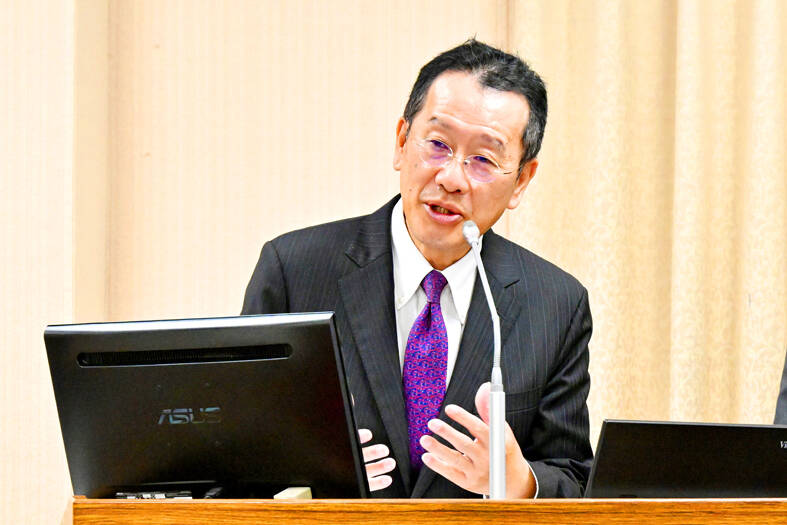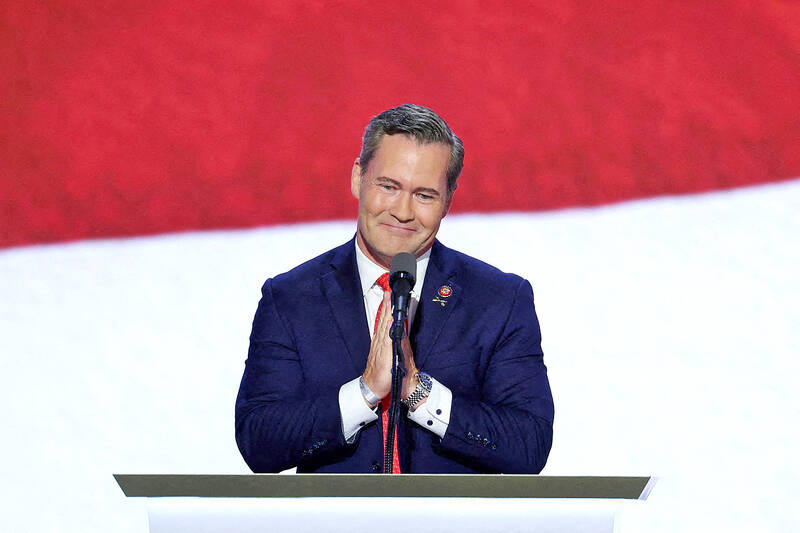It is up to the US to decide what to do with Taiwan’s decommissioned Hawk anti-aircraft missiles, Minister of National Defense Wellington Koo (顧立雄) said yesterday, when asked if they would be transferred to Ukraine.
The US and its allies have provided billions of dollars of arms to Ukraine since Russia attacked the country more than two years ago in what Moscow calls a “special military operation.”
That has included weapons being phased out by some Western nations, such as F-16 jets from the Netherlands.

Photo: George Tsorng, Taipei Times
Speaking to reporters at the Legislative Yuan and responding to a question on whether Taiwan’s decades-old Hawk missiles could go to Ukraine, Koo said the nation no longer needed the weapons and their decommissioning was being handled in accordance with regulations.
DONATION CLAIM

Photo: Reuters
Forbes magazine, citing former Pentagon official Tony Hu (胡振東), on Tuesday reported that Taiwan has donated its surplus Hawk surface-to-air missile batteries to the Ukrainian Air Force.
“If the US side requests that we transfer them back, we will do so in accordance with the regulations and return them, and then the US would decide what to do with them,” Koo said, without elaborating.
Taiwan has offered strong moral support to Ukraine since the beginning of the invasion, seeing parallels with the threat Taipei says it faces from China.
Taiwan has not made any public announcements about directly sending weapons to Ukraine.
The defense ministry told the Central News Agency that Koo was referring to specific regulations on the management of military items and equipment, and obsolete military equipment.
Taiwan is in the process of upgrading its own missile defenses, including inking a US$2 billion deal with the US for National Advanced Surface-to-Air Missile System (NASAMS) medium-range air defense solutions that includes the Advanced Medium-Range Air-to-Air Missiles Extended Range surface-to-air missiles.
WEAPON PURCHASE
The NASAMS has been battle tested in Ukraine and represents a significant increase in air defense capabilities. The US is exporting it to Taiwan as demand for the system surges.
Koo was also asked about a recent Financial Times report saying that Taiwan might be considering a large-scale weapons purchase, including Aegis destroyers, E-2D Advanced Hawkeyes, Patriot missiles and F-35 jets, to “show that they are serious” about defending the nation to US president-elect Donald Trump.
Taipei is open to all available options to meet its defensive needs, Koo said.
However, he did not identify any specific weapons systems.
When asked by a lawmaker to comment on Trump’s pick of Fox News host and US Army veteran Pete Hegseth as US secretary of defense, Koo said that Hegseth is relatively young and a strong supporter of “America first.”
The US and Taiwan have a common fundamental interest, he said, adding that with the Russia-Ukraine and Israel-Hamas wars going on, conflict in the Taiwan Strait would be unacceptable.
The continuity of the “status quo” in the Taiwan Strait is in both countries’ interest, and Taipei and Washington have common ground in their discussions, Koo said.
Asked by a reporter to comment on Trump having picked Republican Representative Mike Waltz as national security adviser, Koo said he respects the personnel changes in democratic politics.
However, he also wants to express gratitude to Waltz for having led the Foreign Military Sales Technical, Industrial and Governmental Engagement for Readiness (TIGER) Task Force in the House of Representatives last year, which helped accelerate the delivery of weapons purchases to Taiwan, he said.

Intelligence agents have recorded 510,000 instances of “controversial information” being spread online by the Chinese Communist Party (CCP) so far this year, the National Security Bureau (NSB) said in a report yesterday, as it warned of artificial intelligence (AI) being employed to generate destabilizing misinformation. The bureau submitted a written report to the Legislative Yuan in preparation for National Security Bureau Director-General Tsai Ming-yen’s (蔡明彥) appearance before the Foreign Affairs and National Defense Committee today. The CCP has been using cognitive warfare to divide Taiwanese society by commenting on controversial issues such as Taiwan Semiconductor Manufacturing Co’s (TSMC, 台積電) investments in the

INVESTIGATION: The case is the latest instance of a DPP figure being implicated in an espionage network accused of allegedly leaking information to Chinese intelligence Democratic Progressive Party (DPP) member Ho Jen-chieh (何仁傑) was detained and held incommunicado yesterday on suspicion of spying for China during his tenure as assistant to then-minister of foreign affairs Joseph Wu (吳釗燮). The Taipei District Prosecutors’ Office said Ho was implicated during its investigation into alleged spying activities by former Presidential Office consultant Wu Shang-yu (吳尚雨). Prosecutors said there is reason to believe Ho breached the National Security Act (國家安全法) by leaking classified Ministry of Foreign Affairs information to Chinese intelligence. Following interrogation, prosecutors petitioned the Taipei District Court to detain Ho, citing concerns over potential collusion or tampering of evidence. The

‘COMPREHENSIVE PLAN’: Lin Chia-lung said that the government was ready to talk about a variety of issues, including investment in and purchases from the US The National Stabilization Fund (NSF) yesterday announced that it would step in to staunch stock market losses for the ninth time in the nation’s history. An NSF board meeting, originally scheduled for Monday next week, was moved to yesterday after stocks plummeted in the wake of US President Donald Trump’s announcement of 32 percent tariffs on Taiwan on Wednesday last week. Board members voted to support the stock market with the NT$500 billion (US$15.15 billion) fund, with injections of funds to begin as soon as today. The NSF in 2000 injected NT$120 billion to stabilize stocks, the most ever. The lowest amount it

NEGOTIATIONS: Taiwan has good relations with Washington and the outlook for the negotiations looks promising, Minister of Economic Affairs J.W. Kuo said Taiwan’s GDP growth this year is expected to decrease by 0.43 to 1.61 percentage points due to the effects of US tariffs, National Development Council (NDC) Minister Paul Liu (劉鏡清) said at a meeting of the legislature’s Economics Committee in Taipei yesterday, citing a preliminary estimate by a private research institution. Taiwan’s economy would be significantly affected by the 32 percent “reciprocal” tariffs slapped by the US, which took effect yesterday, Liu said, adding that GDP growth could fall below 3 percent and potentially even dip below 2 percent to 1.53 percent this year. The council has commissioned another institution